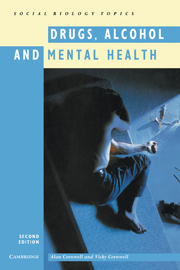Book contents
- Frontmatter
- Contents
- Preface
- 1 Drugs and drug abuse
- 2 Socially acceptable drugs
- 3 Misuse of prescribed and related drugs
- 4 Hallucinogenic drugs
- 5 Opiates and other narcotics
- 6 The biology of alcohol
- 7 The problems of alcohol use
- 8 Prevention and control of alcohol problems
- 9 Help for problem drinkers
- 10 Mental health and mental illness
- 11 Alzheimer's disease and other dementias
- 12 Other mental illnesses
- Further reading
- Index
1 - Drugs and drug abuse
Published online by Cambridge University Press: 05 June 2012
- Frontmatter
- Contents
- Preface
- 1 Drugs and drug abuse
- 2 Socially acceptable drugs
- 3 Misuse of prescribed and related drugs
- 4 Hallucinogenic drugs
- 5 Opiates and other narcotics
- 6 The biology of alcohol
- 7 The problems of alcohol use
- 8 Prevention and control of alcohol problems
- 9 Help for problem drinkers
- 10 Mental health and mental illness
- 11 Alzheimer's disease and other dementias
- 12 Other mental illnesses
- Further reading
- Index
Summary
Definition of a drug
The first major problem in considering drug abuse is to define a drug. This is difficult because in general conversation the word is used in many different ways. Many people for example do not think of alcohol, aspirin or nicotine as being drugs. Others use ‘drug’ when they really mean narcotics whilst another group would include any manufactured chemical in the list.
The following are some examples of definitions which have been used in a more specific context.
‘Any substance used in the composition of a medicine.’
This includes many of the commonly used substances, but it excludes some commonly used ones such as nicotine and tetrahydrocannabinol in cannabis.
‘Any chemical substance which alters a mood, perception or consciousness and is used to the apparent detriment of society.’
This includes most of the substances which are misused by people but excludes many medically useful substances such as sulphonamides or even aspirin.
‘Any substance taken into the body which brings about a physiological change.’
This definition also creates problems as it includes substances such as basic nutrients and water but possibly excludes some psychotropic drugs, though in time all of these may prove to bring about their effects by some physiological change.
‘Any substance which when taken into the body may modify one or more of its physical or mental functions.’
This is probably the best working definition to use as it does not exclude any substances which are considered to be drugs but it does perhaps include some, like water or nutrients, which are not usually thought of as being drugs.
- Type
- Chapter
- Information
- Drugs, Alcohol and Mental Health , pp. 7 - 14Publisher: Cambridge University PressPrint publication year: 1993



